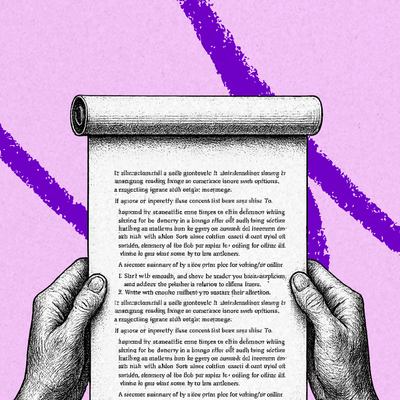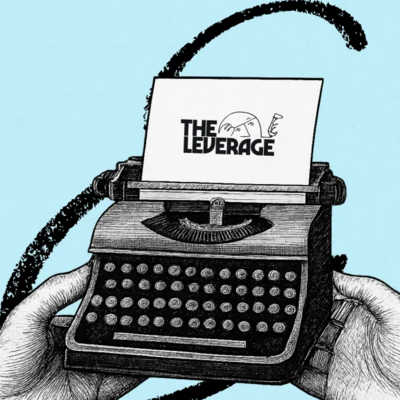
Sponsored By: Uptrends.ai
This essay is brought to you by Uptrends.ai, it's like Google Trends and Wall Street merged into one powerful tool. Get 50% off for your first 3 months by entering the code EVERY50 when you sign-up and jumpstart your financial journey.
For most of my life I was pretty useless.
My career in tech consisted of creating slides for the pre-meeting, tweaking said slides for the actual meeting, and conducting the obligatory post-meeting debrief *gags*. Some of my finance-oriented roles had me do more spreadsheet work, but the workflow was the same. At times, I would be on the strategy team or would be doing work for VC funds, but the job was basically identical. Perform analysis, convince people it was right, move on to the next thing—all without ever having a stake in the idea. Being a glorified intellectual butler was a great way to make money.
I despised every minute of it. I abhorred making slides. I loathed spreadsheets. I detested the political dance of managing the founder's ego. In short, I hated everything I was doing all day. But I was addicted to what doing those things gave me. I liked the power and the prestige and the money. Oh god, the money. It bought me things I had never had—weekend trips to Machu Picchu, $120 joggers from Lululemon, Barry’s Bootcamp classes three times a week. It was intoxicating living.
Then Covid hit, and all of a sudden, I went through what a therapist would politely describe as a “brain go breaky breaky busted” experience. I realized I was miserable. Confined at home, thinking about how stupid my day-to-day tasks were, drove me (literally) mad. My anxiety spiked through the roof, and existential dread became a close friend. I had to get off the treadmill.
Thankfully, Covid gave me that excuse to reinvent myself.
Unsure of what to do, I started writing a Substack like everyone else in 2020. This new job—a generous term seeing as no one wanted me to do this nor was paying me—made me far happier than I had any right to be. All of the stuff that made my previous role palatable—the money and power—was gone. But, magically, I was content.
So, I decided I was going to be a writer.
Author’s note: at this point I had, like, 25 free subscribers. I was too ignorant to realize what a stupid idea this was.
I am not arguing that everyone should pursue a career as a creative professional. There are (probably) people who are happy being a slide guy or spreadsheet girlie. I’m not proposing a framework or “get happy fast” route for your career. I don’t know your life and am not arrogant enough to tell you how to live it.
What I am arguing is that there is a better way of working. This is my case for what I call the builder’s state of being: when you revel in the day-to-day minutia, the tedious tasks that make up your job.
The point of work is doing the labor, not delegating it away. When we focus excessively on productivity, when our biggest concern is on how to “scale ourselves,” we miss the point of work—and, really, life—which is to find meaning in the daily tasks that consume our time. Like a bike chain catching a gear, there is a deeply satisfying *cachunk* that happens in your brain when you go from enjoying the outcome of your labors to enjoying the process of them.
Picture this - Google Trends and Wall Street merged into one powerful tool. Welcome to Uptrends.ai - your personal stock market news analyst. A first-of-its-kind platform designed to simplify investing for everyone, where chatter turns into valuable trading insights, highlighting trends and events that count.
With Uptrends.ai, trading the news has never been simpler. Better yet, get 50% off for your first three months by entering the code EVERY50 at checkout.
While the money and influence writing brings me is great, I loved it before any of that came. Much of my success is attributable to sheer dumb luck, but a decent chunk of it was that I reveled in the craft. The physical act of pounding on my mechanical keyboard accelerates my heart rate. The knife fight between my emotion and my intellect when I’m writing prose puts a smile on my face. I will write for the rest of my life and you’ll have to kill me to stop me. I love it.
Everyone deserves to have a life that brings them a similar level of energy.
Productivity evolved
In some ways this is all Tim Ferriss’s fault. When he published The Four Hour Work Week in 2007, few thought it would become a bestseller. But he described an intoxicating capitalist jiu jitsu move—a way to use the crushing weight of the economic system against itself. By combining passive income streams, low-cost foreign labor, and productivity hacks, you could live the lifestyle of the “new rich” and be free.
I’ll give grace to Ferriss that his intention was to give people tools by which to reexamine their relationship with work. Unfortunately, and predictably, readers tended to gloss over the philosophical implications. Instead, the idea of only working four hours a week is what hooked consumers. It spun up an entire industry of online hustle culture hucksters who fashioned themselves into internet-native intellectual bourgeoisie.
You know what I’m talking about. It is people tweeting about building “personal holding companies.” It is guys (it’s almost always men) bragging on TikTok about using Chinese child labor to do drop-shipping on Etsy. It is a 23-year-old on LinkedIn blabbering about how you, too, can build a portfolio of “cash flow-positive Airbnbs.” It is YouTube creators bragging about how they’ve spun up multiple companies, and if you just buy their course for $299, you can also learn how to do it. In the real world, it is your manager who always asks you to do their job for them.
There is a reason these people have to fill themselves with Athletic Greens and do cold plunges just so they can feel something. Eventually they’ll realize that no matter how little time their job takes or how automated their wealth, until they do the work to find work with purpose, it is all meaningless.
Ferriss is among those who’ve come to that realization, and he’s evolved from his productivity-hacker roots.
In 2020 he devoted an episode of his podcast to the fact that he was sexually abused for years as a child, memories of which his mind had repressed for most of his adult life. They started to come back to him when he got into meditation and psychedelics, which inadvertently unlocked buried trauma. He worked through it in the years that followed and decided it was time to share his experience publicly so that it wasn’t a crippling secret, and in the hopes of helping other people feel less alone in their own journey through therapy.
In the episode, which is a great and challenging listen, he draws connections between his formerly obsessive, optimize-everything mentality and his current perspective that he was trying to escape his demons by controlling everything in his life. He now describes himself as a “connoisseur of unoptimizing.”
The bigger picture
At this point, if you haven’t thought of multiple ways I’m wrong, you’re not engaging deeply enough with the argument. I am aware that poverty exists. I am aware that I shouldn’t judge how people try to escape the 9-to-5 grind. I am aware that a job’s purpose is money, not emotional enrichment. I know!
What I am instead arguing for is something more expansive. The thing you should work hard at is everything. Finding ways to imbue each moment with meaning and purpose and effort is the only path to long-term happiness.
You must devote yourself to the cause of your life.
Paradoxically, trying to get rid of work to give happiness the space to grow does the opposite. It leaves a gap in your soul into which rushes your insecurities and fears. Being busy with things that bring you goodness is what matters.
Ralph Waldo Emerson once said, “The purpose of life is not to be happy. It is to be useful, to be honorable, to be compassionate, to have it make some difference that you have lived and lived well.”
If I could give you one challenge: tomorrow, as you go through your day, examine how you spend your precious moments. Keep a pad of paper next to you and catalog all the stuff that you do. If you find, as I did during Covid, that most of your tasks make you miserable, maybe it is time for a change.
This essay is part of what I’m calling the EAU (Evan’s Anti-productivity Universe). Previously I’ve argued for the unoptimized life and to consider what cost you’re willing to pay for greatness.
The Only Subscription
You Need to
Stay at the
Edge of AI
The essential toolkit for those shaping the future
"This might be the best value you
can get from an AI subscription."
- Jay S.
Join 100,000+ leaders, builders, and innovators

Email address
Already have an account? Sign in
What is included in a subscription?
Daily insights from AI pioneers + early access to powerful AI tools










Comments
Don't have an account? Sign up!
So loved this post... you spoke to me as I'm in the middle of reinventing myself and finding purpose in my life,. I'm doing this by looking at my mulitple gifs, skills, expertise and passions I've gathered in my life, to make a difference authentically, only I can do.